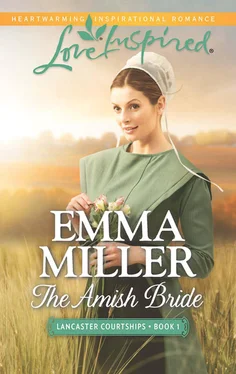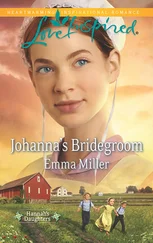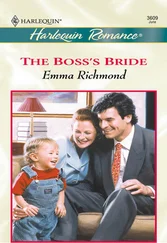She nodded, but she didn’t speak, and he remembered that he’d always liked that about her. Ellen was a good listener, someone you could share important thoughts with.
“Sometimes I think my brother’s meant to be a preacher, or maybe a deacon. He’s way too settled for a man his age. Just look at his driving animal. I always thought you could tell a man’s nature by his favorite driving animal.”
“Neziah drives a good mule,” she suggested.
“Exactly. Steady in traffic. Strong and levelheaded, even docile. An old woman’s horse.” It was no secret that he was different than Neziah. He liked spirited horses and was given to racing other buggies on the way to Sunday worship, not something that the elders smiled on.
“Don’t be so hard on your brother,” Ellen defended. “He has his children’s safety to think about. You know how some of these Englishers drive. They don’t think about how dangerous it is to pass our buggies on these narrow roads.”
“ Jah , I know, but I’m careful about when and where I race. I don’t mean to criticize Neziah. He’s a good man, and I’d not stand to hear anyone criticize him. But he’s too staid for you. Remember that time we all went to Hershey Park? You and me, we liked the fast rides. Neziah, he got sick to his stomach. We’re better suited, and if you’ll give me a chance, I’ll prove it to you.”
“I think I—” She sounded excited for a second then sighed. “I had a bite but I think the fish is playing with me.” She reeled in her line and checked the bait. Half of her worm was missing. “Look at that. Now I’ll have to put on fresh bait.”
He steadied himself against a branch and watched her, wondering why it had taken his father’s lecture to stir him into action. For years he’d been going to all the young people’s frolics, flirting with this girl and that, when all the time he’d hardly noticed Ellen. He had seen her, of course, gone to church with her, worked on community projects with her, eaten at her father’s table and welcomed her to his own home. But he hadn’t thought of her in the way he suddenly did now, as a special woman whom he might want to make his wife. The thought warmed him and made him smile. “You don’t think I’m too young for you, do you?” he asked.
“Nay,” she said, taking her time to answer. “I suppose not. But it’s a new idea for me, that I marry a friend, rather than someone I was in love with.”
Micah felt a rush of pleasure. “How do we know we won’t discover love for each other if we don’t give ourselves the chance?”
Her dark eyes grew luminous. Her bobber jerked and then dove beneath the surface of the creek, but Ellen didn’t seem to notice the tension on her fishing pole. “You think that could happen?”
He grinned. “I think that there’s a very good possibility that that’s exactly what might happen.”
Chapter Three
They walked back to her lane just as twilight was falling over the farm fields. “ Danki , Micah,” Ellen said. “The fishing was fun. I’d forgotten how much I liked it.”
Her first moments alone with him, when they’d left the house, had been awkward. But then they’d fallen back into the easy rhythm of their younger days with none of the clumsiness of the situation that she’d feared. Being so comfortable with Micah made her wonder if maybe they could be happy together. What if Micah was whom God had intended for her all along?
“You should take these,” he said, holding a string of three perch.
“You caught two of them. Don’t you want to take them home to fry for breakfast?”
He still held them out. “Three measly fish for the five of us? Not worth the trouble of cleaning and cooking them. No, you’d best take them.”
“ Danki for the fish, too, then. Dat loves fried fish for breakfast.”
“You’re welcome. And you are going to think about walking out with me,” Micah reminded. “Right?” He stood there, fishing poles in hand, smiling at her and completely at ease.
“ Jah , I will.” She smiled at him. “God give you a restful sleep.”
“And you, Ellen.” He used no courting endearments, but she liked the way he said her name, and she felt a warm glow inside as she savored it. She didn’t want to spoil the feeling and was afraid that he might linger, might want to sit with her on the porch or stay on after her parents had gone to bed. Instead, he bestowed a final grin and strode off whistling in the direction of his own home.
Ellen walked slowly up the driveway and through her father’s barnyard, inhaling deep of the scent of her mother’s climbing roses and the honeysuckle that grew wild along the edge of the hedgerow. She drank in the peace of the coming night. Crickets and frogs called their familiar sounds, and evening shadows draped over the barnyard, easing her feelings of indecision. How wonderful life is, she thought. You expect each day to be like the one before, but the wonder of God’s grace was that you never really knew from one hour to another what would come next.
A single propane lamp glowed through the kitchen window, but the house was quiet. Simeon, Neziah and the boys had left. The only sign of movement was a calico cat nursing kittens near the back door. But the light meant that her parents were still up. Her father was too fearful of fire to retire and leave a lamp burning. Ellen stepped inside, the string of fish dangling from her finger. “Mam?” she called softly. “Dat?”
“Out here.” Her father’s voice came from the front of the house.
Their home was small as Amish homes went, but comfortable. When her father and his neighbors had built it, he and her mother were already past the age when they expected to be blessed with children. A big kitchen, a pantry, a living room, bath and two bedrooms comprised the entire downstairs. Her room was upstairs in an oversize, cheerful chamber with two dormer windows and a casement window that opened wide to let in fresh breezes from the west. She also had a small bath all to herself, a privacy that few Amish girls had. Growing up, her girlfriends, most from large families, had admired the luxury, but she would have gladly traded the cheerful room with its yellow trim, clean white claw-foot tub, fixtures and tiny shuttered window for a bevy of noisy sisters crowded head to foot in her bedroom.
The double door near the staircase stood open, and her father called again to her from the front porch. “Come, join us. And bring another bowl for beans.”
Butter beans, Ellen thought. The family often sat on the porch in the evenings this time of year and shelled butter beans. She and her mother canned bushels of beans for winter. Quarts of the beans already stood in neat rows in the pantry beside those of squash, English peas, string beans, corn, tomatoes and pickles. She wrapped the fish in some parchment paper and put it in the propane-run refrigerator. They’d keep until morning when she or her father would clean them. She washed her hands, found a bowl and carried it out to the porch. Her parents sat side by side in wooden rocking chairs, baskets of lima bean hulls and bowls of shelled beans around them.
“Catch any fish?” her father asked.
“In the fridge. If you clean them, I’ll fry them up for our breakfast.” Ellen took the chair on the other side of him. Her chair. Her mother sat still, her chin resting on her chest; she was snoring lightly. Her mother often drifted off to sleep in the afternoon and early evening. She didn’t have the vigor that Ellen was used to, and she worried about her. “Has she been asleep long?”
“Just a little while. Company wore her out.” He dumped butter beans still in their shells into Ellen’s bowl. “Course, you know how she loves to have people come. And she adores children, even those rascals of Neziah’s. Nothing makes her happier than stuffing a child with food, unless it’s singing in church. Your mother always had the sweetest voice. It was what drew me to her when we were young.”
Читать дальше












